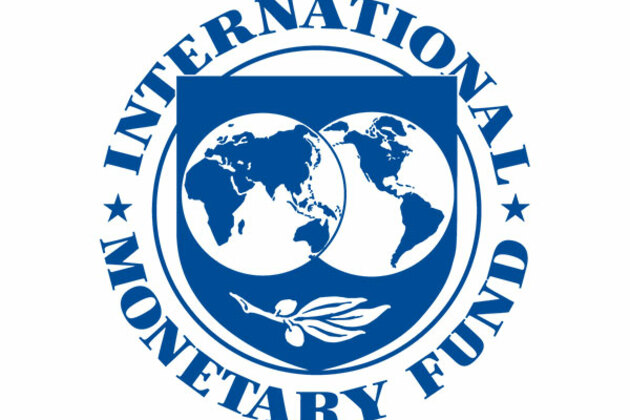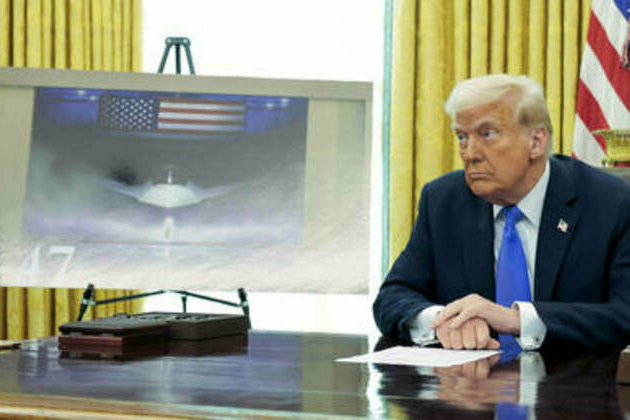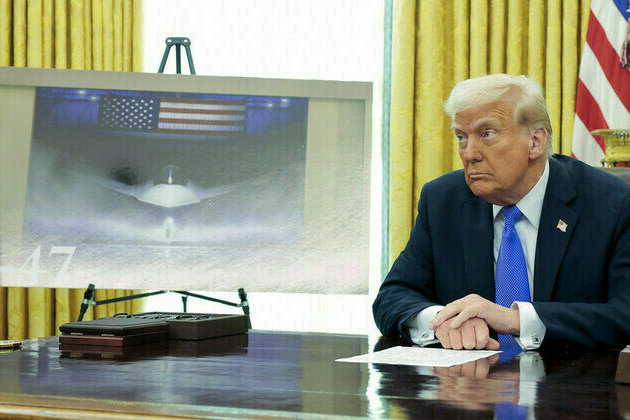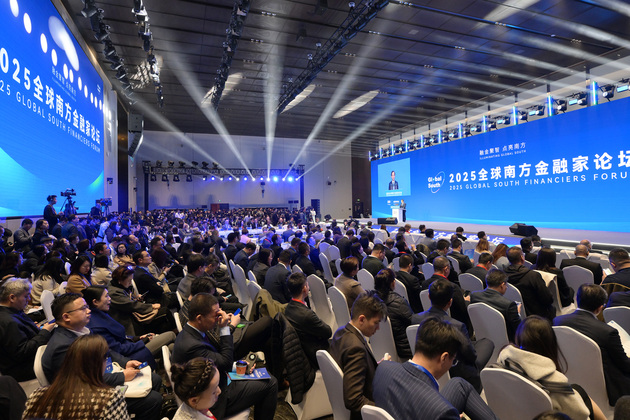Guest Opinion: Trump's tariffs and their economic fallout
Xinhua
22 Mar 2025, 17:46 GMT+10
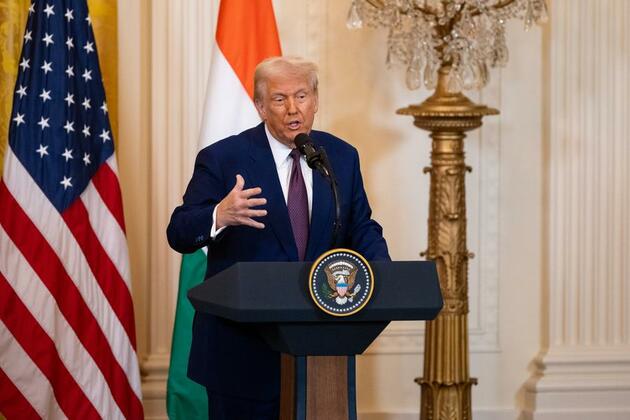
U.S. President Donald Trump attends a press conference at the White House in Washington D.C., the United States, Feb. 13, 2025. (Xinhua/Hu Yousong)The immediate effects of the tariffs are already evident. By imposing tariffs on goods from other countries, Trump's policies have led to higher costs for businesses, which are often passed on to U.S. consumers in the form of increased prices for everyday goods like clothing, electronics and household items.by Maya MajueranU.S. President Donald Trump's tariffs have unsettled investors, sparking concerns about an economic downturn and triggering a stock market sell-off in the United States.The recent market volatility is largely fueled by worries over the extra tariffs on imports, which have become a central element of Trump's trade strategy. Designed to shield domestic industries and address trade imbalances, the tariffs have instead created significant uncertainties with far-reaching consequences for the U.S. economy, undermining the very goals the tariffs are meant to achieve.The immediate effects of the tariffs are already evident. By imposing tariffs on goods from other countries, Trump's policies have led to higher costs for businesses, which are often passed on to U.S. consumers in the form of increased prices for everyday goods like clothing, electronics and household items. This has placed a disproportionate burden on lower-income households, which now spend a larger share of income on the essentials. Additionally, as global trade is affected, businesses reliant on imports or exports are facing reduced profit margins, potential job losses and disrupted supply chains.The long-term impact of the tariff policies remains yet to be seen. But retaliatory tariffs by affected countries have already complicated the situation, creating a cycle of economic tension that could lead to more permanent damage. The lack of clarity about the duration and severity of these challenges has left businesses, investors and the public in a state of cautious anticipation. Trump and his economic advisers have even warned the public of potential economic hardships as a result of the policy changes.Many companies are struggling to absorb the increased costs caused by tariffs, attempting to avoid raising prices for consumers. However, it remains unclear how long they can sustain this strategy without passing on the added expenses.The uncertainty created by trade tensions has also led U.S. businesses to adopt a cautious approach. Many are delaying investments and holding back on hiring, leading to a general slowdown in economic activity. This hesitancy is compounded by the fact that tariffs are driving up the cost of parts sourced from various countries, raising the overall production cost for U.S.-manufactured goods. As a result, finished U.S. products are becoming more expensive and less competitive in global markets.The unpredictable and inconsistent nature of U.S. trade policies has made it difficult for companies to plan for the future, for consumers to anticipate costs, and for investors to assess risks. Adding to the uncertainty are growing concerns about large-scale cuts to the federal government workforce and reductions in public spending. Such measures could have far-reaching consequences, including slower economic growth, reduced public services and a ripple effect on industries reliant on government contracts or funding.A customer shops at a Target store in Rosemead, Los Angeles County, California, the United States, on March 4, 2025. (Photo by Zeng Hui/Xinhua)These cuts could disproportionately impact the most vulnerable Americans, who are already struggling to make ends meet. Reduced access to essential services like health care, housing assistance and food security programs could exacerbate inequality and hardship. This, in turn, could weaken consumer spending and slow economic recovery, as lower-income households are forced to cut back even further on expenses.The U.S. economy is already showing signs of a slowdown. The recent downturn in the stock market could make the situation worse, potentially inducing a further reduction in consumer spending, which drives two-thirds of the U.S. economy.The U.S. Federal Reserve is widely expected to keep interest rates unchanged, as a rate cut could worsen economic risks stemming from the uncertainty created by Trump's tariffs. However, maintaining the current level may not be enough to boost consumer spending or stimulate business investment at this critical stage.Meanwhile, Trump's immigration crackdown adds to difficulties facing key industries heavily reliant on immigrant labor and suffering a labor shortage, including agriculture, construction and health care.The growing uncertainties surrounding tariffs are also expected to impact inflation, as higher costs will lead to upward pressure on consumer prices. This could push inflation beyond the target levels set by central banks, creating additional challenges for policymakers. In recent days, economic analysts have raised alarms about the possibility of a U.S. recession, citing growing investor unease over the disruptive effects of Trump's trade policies.The U.S. economy is facing mounting challenges, many of which stem from perceived mismanagement and structural issues, such as an unprecedented debt level, driven up partly by persistent budget deficits and increased government spending. This unsustainable fiscal trajectory threatens long-term economic stability and limits the government's capability to respond effectively to future crises. High debt levels could also erode investor confidence, leading to higher borrowing costs and reduced economic growth.Without significant fiscal reforms and a clear strategy to address these issues, the U.S. economy risks further deterioration, undermining its global economic leadership and the well-being of its citizens. The combination of tariffs, policy instability, labor shortages and mounting debt creates a perfect storm of economic challenges. To restore confidence and ensure sustainable growth, policymakers must adopt a more coherent and targeted approach, addressing both the immediate and long-term consequences of these policies.Editor's note: Maya Majueran currently serves as a director of Belt Road Initiative Sri Lanka, an independent and pioneering organization with strong expertise in Belt and Road Initiative advice and support.The views expressed in this article are those of the author and do not necessarily reflect the positions of Xinhua News Agency.
 Share
Share
 Tweet
Tweet
 Share
Share
 Flip
Flip
 Email
Email
Watch latest videos
Subscribe and Follow
Get a daily dose of Greek Herald news through our daily email, its complimentary and keeps you fully up to date with world and business news as well.
News RELEASES
Publish news of your business, community or sports group, personnel appointments, major event and more by submitting a news release to Greek Herald.
More InformationInternational Business
SectionGuest Opinion: Trump's tariffs and their economic fallout
U.S. President Donald Trump attends a press conference at the White House in Washington D.C., the United States, Feb. 13, 2025. (Xinhua/Hu...
Pakistan: IMF 'proposes' Rs 15tr tax target ahead of next budget
Islamabad [Pakistan], March 22 (ANI): The International Monetary Fund (IMF) has proposed a tax target of over Rupees 15 trillion for...
Electronic payments in Korea hit new high in 2024
Seoul [South Korea], March 22 (ANI/WAM): The amount of payments made electronically in the Republic of Korea reached a record high...
Trump awards contract for 'the most lethal aircraft ever' to Boeing
The F-47 is something the likes of which nobody has seen before, the US president has said ...
Trump awards contract for the most lethal aircraft ever to Boeing
The F-47 is something the likes of which nobody has seen before, the US president has said US President Donald Trump has said he...
Global South contributing to more equitable, inclusive int'l financial order
This photo taken on March 20, 2025 shows the opening ceremony of the 2025 Global South Financiers Forum in Beijing, capital of China....
Mediterranean
SectionInterview: China has solid foundation for growth, offers global opportunities -- expert
People visit the 5th China Cross-Border E-Commerce Trade Fair in Fuzhou, southeast China's Fujian Province, March 18, 2025. (Xinhua/Lin...
(SP)CHINA-SHANGHAI-FORMULA 1-QUALIFYING (CN)
(250322) -- SHANGHAI, March 22, 2025 (Xinhua) -- Aston Martin's driver Fernando Alonso of Spain competes during the qualifying of the...
(SP)CHINA-NANJING-ATHLETICS-WORLD ATHLETICS INDOOR CHAMPIONSHIPS-POLE VAULT-MEN (CN)
(250322) -- NANJING, March 22, 2025 (Xinhua) -- Emmanouil Karalis of Greece reacts during the men's pole vault final at the 2025 World...
Yokohama city celebrates Chinese New Year with grandeur
Yokohama [Japan], March 1 (ANI): The Chinese New Year celebration was recently held in Yokohama city featuring stunning performances...
(SP)CHINA-SHANGHAI-FORMULA 1-SPRINT(CN)
(250322) -- SHANGHAI, March 22, 2025 (Xinhua) -- Williams' driver Carlos Sainz (front) of Spain drives during the sprint race of the...
SLOVENIA-APACE-INTERNATIONAL FOREST DAY
(250322) -- APACE, March 22, 2025 (Xinhua) -- People plant trees in the forests near Apace, a small village in northeastern Slovenia,...

